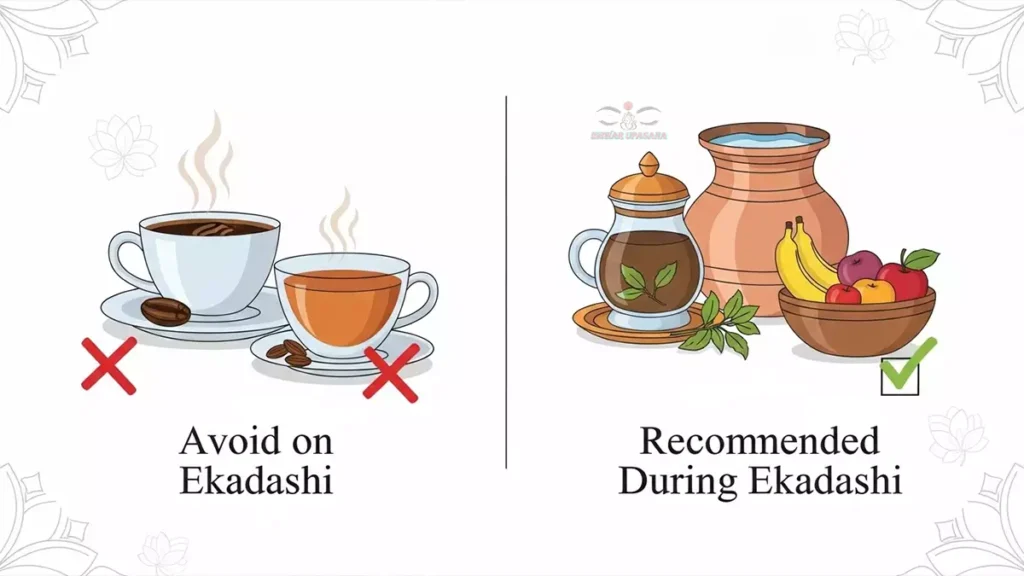
What Is Ekadashi—and Is Coffee Allowed on Ekadashi?
Ekadashi is the eleventh lunar day (tithi) of each fortnight in the Hindu calendar. Observed twice a month, it is a spiritually significant day dedicated to fasting, devotion, and inner purification, especially honored in Vaishnavism and Sanatan Dharma.
According to ancient scriptures, observing Ekadashi with sincerity helps cleanse karmic impressions, cultivate discipline, and bring the devotee closer to Lord Vishnu. It is believed to enhance spiritual merit (punya) and support one’s path toward liberation.
While most devotees know that grains and pulses should be avoided on this day, a common doubt still arises:
“Is coffee allowed on Ekadashi?”
In this article, we’ll explore the answer to that question from both scriptural guidance and practical experience, along with sattvic alternatives for a more spiritually focused fast.
Can You Drink Coffee or Tea on Ekadashi?
The answer depends on how strictly you are observing the fast—whether it’s Nirjala (water only), Phalahar (fruits and milk), or a partial fast.
However, traditionally and spiritually speaking:
Coffee and tea are not recommended during Ekadashi fasting, especially if you’re observing it for spiritual upliftment and sattvic purification.
Why Coffee and Tea Are Best Avoided on Ekadashi
1. They Disturb Sattvic Balance
Ekadashi is intended to cultivate sattva—a state of clarity, purity, and calmness.
- Coffee and tea are stimulants.
- They are classified as rajasic or tamasic in Ayurveda and Vedic dietary science.
- These substances disturb mental peace, increase restlessness, and weaken concentration.
Such effects go against the spiritual goals of Ekadashi, which include meditation, mantra chanting, and inner stillness.
2. They Break the Subtle Purity of the Fast
Fasting isn’t just about what you avoid—it’s also about what you allow into your consciousness.
- Even though coffee and tea don’t contain grains, they are chemically processed and lack sattvic purity.
- Consuming them can reduce the spiritual merit (punya) of your fasting efforts.
“A true fast is as much about purity of thought and energy as it is about food.”
3. They Reinforce Dependency
Ekadashi is a time for self-discipline and letting go of cravings.
- Regular consumption of caffeine builds dependency.
- If you struggle to fast without tea or coffee, it indicates attachment, which the fast is meant to help you break.
By avoiding stimulants, you strengthen your willpower and move closer to true spiritual freedom.
Are There Any Exceptions?
Yes—practical life and personal health do matter. In certain situations, limited use of tea or coffee may be acceptable:
Possible exceptions:
- If you have health conditions or medical dependencies
- If you’re a beginner in spiritual practice
- If you’re a working professional facing withdrawal symptoms
However, this should be seen as a temporary adjustment, not a long-term habit.
Tip: Replace regular tea or coffee with:
- Herbal teas
- Warm lemon water
- Tulsi-infused water
These alternatives are sattvic, easy to digest, and support your spiritual focus.
Best Practices for a Spiritually Pure Ekadashi
If your goal is spiritual elevation, here’s how to keep your Ekadashi fast pure and powerful:
Consume only:
- Water
- Herbal infusions (like tulsi tea)
- Fruits, nuts, and milk (if doing Phalahar)
Avoid:
- Coffee, tea, soft drinks
- Processed or chemically treated foods
- Onion, garlic, and heavy spices
Engage in:
- Mantra chanting and japa
- Reading sacred scriptures like the Bhagavad Gita or Vishnu Sahasranama
- Bhajans and kirtans
- Meditation, introspection, and satsang
Bonus Tip:
Reduce sleep, avoid laziness, and stay focused on devotional activities.
Final Verdict: Is Coffee Allowed on Ekadashi?
From a technical standpoint, coffee and tea do not break the fast since they don’t contain grains or pulses.
But from a spiritual and ethical perspective, they weaken the sanctity and purpose of Ekadashi.
“Ekadashi is not a detox diet—it’s a doorway to devotion.”
If your goal is true spiritual upliftment, avoid coffee and tea. If you’re just starting out, take small steps—but aim to eventually embrace a sattvic, stimulant-free fast.
Conclusion
Fasting on Ekadashi is a divine offering to Lord Vishnu—a time for self-purification and inner transformation. While stimulants like coffee and tea may seem harmless, they interfere with the subtle, sacred energy of the fast.
Choosing purity over pleasure opens you up to deeper spiritual experiences. Replace coffee with mantra, and tea with tulsi water—and let the divine essence of Ekadashi illuminate your heart.
“Over time, letting go of small indulgences leads to greater peace, clarity, and connection with the Divine.”
FAQ– Ekadashi Fasting Rules: Can I Drink Coffee or Tea on Ekadashi?
Q: Is coffee allowed on Ekadashi?
A: Technically, coffee does not break the fast since it doesn’t contain grains or pulses. However, it is discouraged from a spiritual perspective because it is a stimulant and considered rajasic or tamasic in Ayurveda. It disturbs mental clarity and reduces the sattvic quality of the fast.
Q: Is milk tea allowed on Ekadashi?
A: Milk tea contains caffeine and processed tea leaves, which are not sattvic. While some beginners consume it, traditional fasting guidelines recommend avoiding it. Plain warm milk or herbal tulsi tea is a more sattvic alternative.
Q: What beverages can I safely drink on Ekadashi?
A: The best beverages to consume during Ekadashi fasting include: Plain water, Warm milk, Herbal teas (like tulsi, ginger, or fennel), Coconut water, Avoid caffeinated or artificially flavored drinks.
Q: I get headaches without coffee—what should I do while fasting?
A: If you’re used to caffeine and experience withdrawal symptoms, you can start by gradually reducing intake before Ekadashi. In such cases, herbal alternatives like tulsi or ginger tea can help. Over time, your body will adjust, making future fasts more spiritually pure and less physically stressful.
